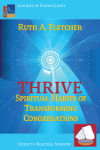Sunday School Today: Authority and Truth
 I think I titled the next chapter in my book When People Speak for God rather pretentiously: Authority and Truth. That’s what we’ll be discussing today in my Sunday School class.
I think I titled the next chapter in my book When People Speak for God rather pretentiously: Authority and Truth. That’s what we’ll be discussing today in my Sunday School class.
As I was reading the chapter, I came across the following, which ties into several things I’m thinking about these days:
There is, however, a deeper claim that’s involved in both the virgin birth and the resurrection. These doctrines state that God is fundamentally interested in communion with human beings. In the virgin birth we have the statement that God is prepared to share our form and our condition and to become a part of that history. In the crucifixion, God says that he is prepared to carry that sharing all the way, to experience death. In the resurrection, he states that despite his willingness to share it, he’s above it, and thus able not just to communicate with us, but to redeem us.… (pp. 135-136)
I call my view of inspiration incarnational, because I see God’s Word, however it is expressed when it is communicated with human beings, as a form of incarnation. The problem with this is that I think the orthodox doctrine of the incarnation is not well understood. (There is, of course, the sense it which it will never be well understood and will always be a mystery!) But the way people often hear the term “incarnational” in connection with inspiration is as a claim that the Bible is a mixture of divine and human. When I call scripture incarnational, I do not mean a mixture. I mean that it is all divine and all human. We can sense aspects of divine and aspects of human, just as we can with Jesus the man, but we cannot divide.
Inspiration is all-the-way incarnation as well. God’s power is contained in the finite form. What we need is ears to hear and eyes to see.
I’ll have more to say about this over the next few days.


I think God is truly revealed through the incarnation. In some ways, your view is similar to Barth’s, in how he speaks that Scripture becomes God’s word, when we get Holy Spirit illumination of it. I’m not sure that I fully understand Barth’s understanding – Forgive me if I understand your position wrongly – within your framework, I see that God’s word is human words (recording divine / human engagement ) which becomes incarnational when the word is illuminated by the Spirit and comes alive in us.
I must admit that I am not a Barthian because I can’t really read Barth. 🙂 I’ve tried, and I haven’t found it fruitful. I read a good deal about him, because so many of my friends and also my “go to” people in theology and church life are Barthian.
What I mean when I say “incarnational” is that the words of scripture are both fully human and fully divine. I’ll be blogging a bit more on this. I have a partially written blog on 2 Timothy 3:16,17 that I hope to finish soon. But briefly, rather than thinking the text becomes the Word of God as it is illuminated by the Spirit (or rather, that it only becomes the Word at that point, I believe that it is a divine-human endeavor from start to finish. That is, God does inspire the prophet, but the prophet expresses that inspiration in the words and ideas available in his time. This is both an illumination and a coming alive. Similarly, in the audience that first heard or read the Word (hearing for most OT prophets, reading for Paul’s epistles, for example) must be illuminated by the Spirit so the Word of God becomes part of them. Those who transmit the Word are similarly illuminated as are those who made certain inspired works part of the canon of scripture. It is always and at every point a divine-human union.
This touches on everything I believe about scripture, but I think I should leave it to more blogging to try to do that, else I’ll have a blog post in this comment!
Thanks. I understand what you are saying now. I agree. The authors used their own experiences, own words and / or what they heard to write – yet, at the same time, the Holy Spirit inspired those words to be written – and the Holy Spirit was active in the lives and experiences of the others they wrote about.
I look forward to your other blogs.
The critical thing I want to emphasize is “union” not “mixture.” With a mixture, the task is to separate one part from the other. With the union, it is to see how the two work together to advance the overarching story told in scripture.
I like that nuance.